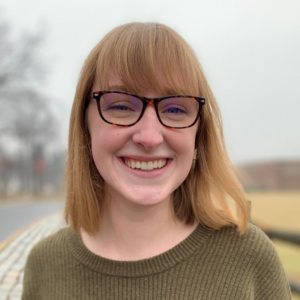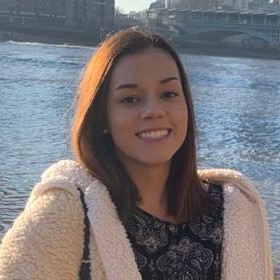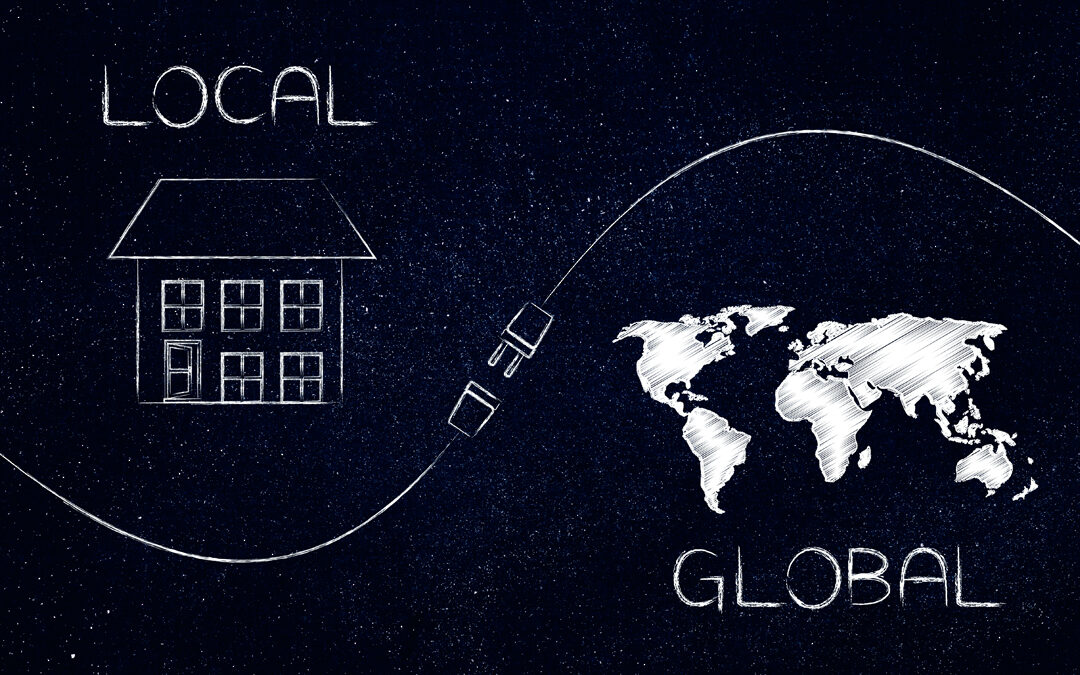This semester, the internship program’s first cohort of social work students—Lauren Gayoso-Acuna, Valentina Gil, Jessica Greene, and Athena McDowall—are completing their fieldwork degree requirements at Elijah’s Promise and New Brunswick Tomorrow. While some of these interns’ projects are very focused—for example, helping people sign up for the federal Supplemental Nutrition Assistance Program (SNAP) or apply for the state’s Charity Care benefits—the students are gaining a broad appreciation for the connections between people’s social and environmental conditions and their health and well-being.
“There’s a natural relationship between social work and global health work,” says Nancy Schley, who is the School of Social Work’s associate director of field education and an assistant professor. “Both incorporate practices that emphasize equity and justice for all people, and both approach problem-solving by considering the multitude of factors that affect people’s lives.” For example, if a person is evicted from their home, there could be many dynamics affecting their ability to pay rent: medical bills, childcare expenses, rising food costs. The lack of a safe place to live also is likely to affect their physical and mental health or well-being. How to address these complex, interrelated issues in order to help people thrive is a main component of both areas of practice.
A Higher Global Calling
“What these students are doing in our local community is part of a higher global calling,” says Rebecca Davis, a core faculty member of Rutgers Global Health Institute and an associate professor in the School of Social Work. “They’re seeing the connections between local and global and learning about the far-reaching context of their work.”
Davis says that collaborating with Rutgers Global Health Institute has involved teaching the social work students about global health throughout their internship. Last fall, for example, institute director Richard Marlink presented an orientation seminar titled “Global Health @ Home,” which covered aspects of “local global health” and social determinants of health. The interns also attend weekly sessions with their field instructor, Charles Senteio, who also is an institute core faculty member. Senteio is a licensed clinical social worker and an assistant professor in the School of Communication and Information. Last year, he mentored a student team in the institute’s Global Health Case Competition that pitched a similar idea as a way to address housing insecurity. That team’s pitch was the impetus for launching the current internship program.
Focused Experience Within a Broader Context
Gayoso-Acuna, Greene, and McDowall have been interning at Elijah’s Promise, a community soup kitchen that “harnesses the power of food to break the cycle of poverty, alleviate hunger, and change lives,” according to its mission statement. There, the students are gaining direct experience in social work program and policy development.
“Our role has been helping to grow the social services department as a whole,” McDowall says.
“One important project is developing the SNAP effort, which is a way for Elijah’s Promise to expand its capacity in terms of how they can serve their clients,” Greene says. In addition to helping individual clients of the soup kitchen apply for SNAP benefits, Gayoso-Acuna, Greene, and McDowall also organize and promote pop-up events throughout New Brunswick to educate city residents about SNAP and offer help with applications. “This is also a way to introduce more people to Elijah’s Promise and potentially help more people who are experiencing food insecurity.”
At New Brunswick Tomorrow, a nonprofit that focuses on community and economic revitalization in the city, Gil has been working on the organization’s Charity Care (New Jersey Hospital Care Payment Assistance Program) initiative. This semester, she is managing two cases of her own, meaning she is helping two New Brunswick residents navigate the Charity Care application process in order to receive free or reduced-cost medical services. She also continues to work with the organization’s director of community health, Manuel Castañeda, on creating and distributing educational information about Charity Care. “I think our outreach is working,” Gil says. “Just this week, a case worker from Catholic Charities asked if I would host a workshop for parents about the resources that are available through Charity Care.”
Field Notes: Student Reflections
The first cohort of social work students to participate in this new internship program share more about their local experiences and global mindsets.
 “Social” Work
“Social” Work
One of my favorite aspects of social work as a field, in general, is that it takes a very holistic approach to working with people and communities. We look at various factors—biological, social and emotional, psychological—that may be influencing a person’s situation.
Before COVID, the soup kitchen operated with a community element. People would know each other, form relationships, share a meal together. Since the pandemic began, we’ve been doing pick-up meals only, so a lot of that community and social element is lost or put on pause.
I’ve been part of a program that aims to revive that. It’s called Fun Fridays, and every week, we would set up a few tables out back, provide some snacks, and play dominoes or other board games with our clients when they came to pick up their food. The feedback has been positive; our clients have said it’s nice to have a table to sit at and people to talk to. Some people will share their stories with you. That’s been one of the highlights for me, focusing on that social and emotional aspect and building relationships with our clients and the people that we’re serving.
– Jessica Greene, Elijah’s Promise intern
 Local Pathway to Global Impact
Local Pathway to Global Impact
My passion is working with immigrants and immigrant rights. Both of my parents are immigrants from Colombia, and I have always wanted to work on that. When I first got this fieldwork placement, I was a little jealous of some of my classmates who were placed in an immigration agency doing refugee and asylee work. But once I learned more about the context of what global health is, I feel like I’m exactly where I need to be.
Having the privilege to work with many immigrants and undocumented people, I’ve seen that you don’t have to be at an immigration agency or go to a different country to be able to work directly with this population. It’s confirmed my passion in that sense.
– Valentina Gil, New Brunswick Tomorrow intern
 Using Language to Overcome Barriers
Using Language to Overcome Barriers
I’m Spanish-speaking, so I get to interact with our clients a little differently because a lot of them predominantly speak Spanish. In a way, I feel like I’ve been able to advocate for them more. For example, there are some resources that undocumented people can’t get access to, such as food stamps, unless they have children. I’ve been trying to figure out ways to do something else for them.
Last semester, I worked with the nutritionist, who had created a list of local food pantries and other soup kitchens. I created step-by-step instructions on how to access these resources and translated it into Spanish to create a handout for our clients. Our common language is a connection, and it’s been nice being able to be an advocate.
– Lauren Gayoso-Acuna, Elijah’s Promise intern
 A New Outlook
A New Outlook
Before I had this internship, I thought I wanted to do clinical social work, like one-on-one counseling. Honestly, I wasn’t sure if I would like the internship. But now that I’m actually doing it, I feel very blessed.
Our involvement so far has been more macro-level social work practice: getting policies into place, developing a program, developing the social services department as a whole. Now I’m thinking, in terms of my career path, maybe I want to go macro, or maybe I want to do a combination of both clinical and macro. Right now, I kind of want to work for the VA [U.S. Department of Veterans Affairs], because I think that not only can I get that clinical work in, but I can also try to help the VA health care system as a whole. I think my experience at Elijah’s Promise will help me to be able to navigate reforming a program.
– Athena McDowall, Elijah’s Promise intern

